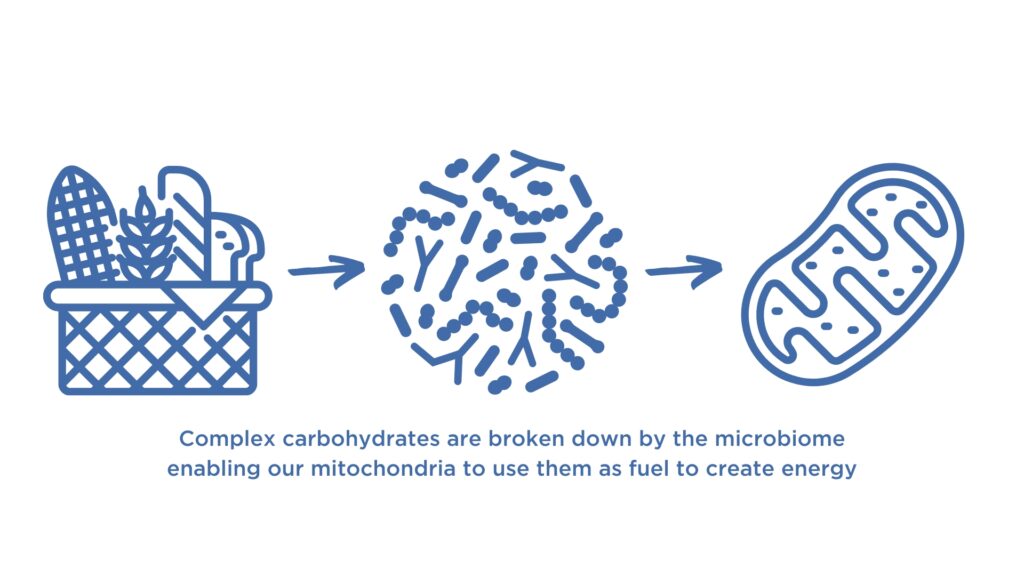Feeling drained and lacking energy is a common concern in our modern lifestyle. While factors like sleep quality, stress levels, and physical activity undoubtedly influence our energy levels, recent research highlights the pivotal role of the gut microbiome. In this blog, we investigate the connection between the gut microbiome and energy levels, investigating how the microorganisms residing in our gut can impact them.
How Do I Increase My Energy Levels?
- Ensure you eat a balanced diet. Our energy levels are influenced by the nutrients we eat, and each requires different amounts of energy to metabolize6. Carbohydrates are the body’s preferred source of energy, so it is important to include complex carbohydrates such as whole grains, fruits, and vegetables in your diet. Proteins are important for muscle repair and growth, and fats provide a concentrated source of energy. Including a variety of nutrient-dense foods in your diet can help improve energy levels.
- Eating sufficient fiber is necessary to ensure sufficient SCFAs are produced, providing additional energy sources, and reducing dysbiosis and inflammation that can lead to fatigue6.
- Avoid processed foods. These can promote the growth of harmful bacteria in the gut, leading to dysbiosis and inflammation and reducing energy levels. These foods can also lead to rapid swings in your blood sugar levels which results in lower energy levels.
- Regular exercise increases the flow of blood and therefore oxygen to the muscles, which can increase energy levels. Exercise also induces a positive change in the types of bacteria that make up your microbiome and the metabolites they produce (7).
- Get enough sleep: Sleep is essential for restoring energy levels and overall well-being. Lack of sleep can lead to fatigue and decreased energy levels. Establish a regular sleep schedule, create a relaxing bedtime routine, and create a sleep-friendly environment to improve sleep quality.
- Manage stress: Chronic stress can drain energy levels. Finding healthy ways to manage stress, such as practicing relaxation techniques, engaging in hobbies, and seeking support from friends and family, can help improve energy levels.
It is important to note that individual energy levels can be influenced by various factors, and what works for one person may not work for another. Additionally, if persistent fatigue or low energy levels persist despite lifestyle changes, it is recommended to consult with a healthcare professional for further guidance.
The Gut Microbiome’s Role in Energy Metabolism:
The microbiome helps break down complex carbohydrates and fibers from our diet that are otherwise indigestible by the human body, enabling our body to acquire energy from these sources (1). In addition, through fermentation these microorganisms produce compounds known as short-chain fatty acids (SCFAs) that can also serve as an energy source, contributing to our overall energy availability (2). SCFAs are also critical to maintaining gut and body health through their action in reducing inflammation.

As everyone’s microbiome is unique, the action of each will vary and can be positively or negatively affected by diet. One example of this is individuals whose microbiome contained more of a certain species of bacteria (Anaerostipes) were identified by researchers as having greater mental energy and lower feelings of both mental and physical fatigue (3). Interestingly, Anaerostipes produces anti-inflammatory molecules that have previously been associated with a reduction in body weight.
An unbalanced gut can result in the creation of inflammatory molecules. These in turn can increase the body’s generation of heat which uses up energy and also induce behaviors to conserve energy which include fatigue (4, 5). Therefore maintaining a healthy gut is an important step in keeping energy levels high.
OMED Health is here to help you on your journey to improve gut health and boost your energy levels. Sign up for our waitlist to ensure you get priority access when the OMED Health Breath Analyzer and App launches. This device is designed to analyze the levels of hydrogen and methane gas in your breath. Our team of experts utilizes this data alongside your symptoms to identify potential underlying causes, crafting a personalized plan tailored to your needs.
References:
- Flint HJ, Scott KP, Duncan SH, Louis P, Forano E. Microbial degradation of complex carbohydrates in the gut. Gut Microbes. 2012 Jul-Aug;3(4):289-306. doi: 10.4161/gmic.19897.
- den Besten G, van Eunen K, Groen AK, Venema K, Reijngoud DJ, Bakker BM. The role of short-chain fatty acids in the interplay between diet, gut microbiota, and host energy metabolism. J Lipid Res. 2013 Sep;54(9):2325-40. doi: 10.1194/jlr.R036012.
- Boolani A, Gallivan KM, Ondrak KS, Christopher CJ, Castro HF, Campagna SR, Taylor CM, Luo M, Dowd SE, Smith ML, Byerley LO. Trait Energy and Fatigue May Be Connected to Gut Bacteria among Young Physically Active Adults: An Exploratory Study. Nutrients. 2022 Jan 21;14(3):466. doi: 10.3390/nu14030466.
- Wang H, Ye J. Regulation of energy balance by inflammation: common theme in physiology and pathology. Rev Endocr Metab Disord. 2015 Mar;16(1):47-54. doi: 10.1007/s11154-014-9306-8.
- Furman D, Campisi J, Verdin E, Carrera-Bastos P, Targ S, Franceschi C, Ferrucci L, Gilroy DW, Fasano A, Miller GW, Miller AH, Mantovani A, Weyand CM, Barzilai N, Goronzy JJ, Rando TA, Effros RB, Lucia A, Kleinstreuer N, Slavich GM. Chronic inflammation in the etiology of disease across the life span. Nat Med. 2019 Dec;25(12):1822-1832. doi: 10.1038/s41591-019-0675-0.
- Montenegro J, Armet AM, Willing BP, Deehan EC, Fassini PG, Mota JF, Walter J, Prado CM. Exploring the Influence of Gut Microbiome on Energy Metabolism in Humans. Adv Nutr. 2023 Jul;14(4):840-857. doi: 10.1016/j.advnut.2023.03.015.
- Clauss M, Gérard P, Mosca A, Leclerc M. Interplay Between Exercise and Gut Microbiome in the Context of Human Health and Performance. Front Nutr. 2021 Jun 10;8:637010. doi: 10.3389/fnut.2021.637010.
- Smith RP, Easson C, Lyle SM, Kapoor R, Donnelly CP, Davidson EJ, Parikh E, Lopez JV, Tartar JL. Gut microbiome diversity is associated with sleep physiology in humans. PLoS One. 2019 Oct 7;14(10):e0222394. doi: 10.1371/journal.pone.0222394.



